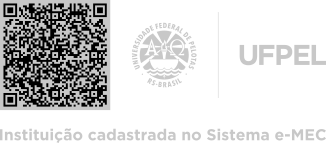Organizations and Markets
Phone number: (+55) (53) 3921 1429
e-mail: pgom@ufpel.edu.br
Website: http://www.ufpel.edu.br/ppgom
Address:
Presentation
The Graduate Program in Organizations and Markets (PPGOM for its spelling in Portuguese) offers the Master’s degree (stricto sensu) in Organizations and Markets, which aims to develop teaching and research activities in the area of Applied Economy.
Target audience
Those interested in graduate level study in the lines of research of PPGOM and who aim to achieve a solid quantitative and theoretical education in Economy. The program requires a full-time course load and is not recommend for working professionals.
Admissions Process
Admission is granted through the National Selection Examination conducted annually by the National Association of Graduate Centers in Economics – ANPEC (www.anpec.org.br).
Additionally, students will be evaluated based on the application of a test of specific knowledge in Mathematics, Statistics, Microeconomics, Macroeconomics and Economics of Organization.
Labor market for graduates
Depending on the line area of research and the thesis topic, students graduating from the PPGOM program will be prepared to work as researchers and/or professors in higher education and research institutions, corporate executives, managers of private and public companies and banks. They are also entitled to pursue further education (PhD) in various areas of knowledge supported by the economic area.
Area of Concentration
Lines of Research
Markets and Development
This line of research analyzes the problems of markets and economic development within the perspective of Applied Economics. The areas of interest are: empirical applications of games theory and competitive strategy; public and corporate finances, monetary and fiscal policies, health economics, education economics, labor economics, crime and corruption economics; impact of economic policies on markets and organizations; design of institutional mechanisms that promote allocative efficiency of economic agents.
Agribusiness Management
This line of research focuses on the study of problems related to the economy of organizations and management of networks and agribusiness chains. Emphasis is on production strategies, pricing structure, logistic and quality bottlenecks, organization of markets, competitiveness, management information systems and technological innovations in the continuum end-consumer supplying of inputs.
Study Plan
The maximum registration period for the student to complete the Master’s Degree is 24 months (2 years).
Leveling – Mandatory
Statistics
Mathematics I
1st Semester – Mandatory Courses
Mathematics II
Microeconomics
Econometrics
2nd Semester – Mandatory and Elective Courses
Macroeconomics
Economics of Organizations I
Research Seminar
1 Elective (list below)
3rd Semester – Elective Courses (2 or 3 courses listed below)
Economics Development
Computational Economy
Economics of Organizations II
Economics of Organizations III
Agribusiness Economics and Management
Agroindustrial Production Strategy
Monetary Economics
Finances
Multicriteria Methods in Decision Support
Organization, Management and Administration of Family Farming
Time Series
Games Theory
Special Topics in Agribusiness
Special Topics in Economics I (Microeconometrics)
Special Topics in Economics II (Evaluation of Social Policies)
Faculty
Andréa Homsi Dâmaso
PhD in Epidemiology (UFPEL), Post-doctoral (London School of Economics and Political Sciences – London, UK).
Areas of interest: Pharmacoepidemiology, Pharmacoeconomics, Health Inequalities, Health Expenditures, Pharmaceutical Policies.
André Carraro
PhD in Economics (UFRGS).
Areas of interest: Government Failures, Applied Microeconomics, Entrepreneurship.
César Augusto Oviedo Tejada
PhD in Economics (UFRGS).
Areas of interest: Applied Econometrics, Health Economics, Health Inequalities.
Cristiano Aguiar de Oliveira
PhD in Economics (UFRGS).
Areas of interest: Applied Econometrics, Regional and Urban economics, Economics of Crime.
Daniel Uhr
PhD in Economics (UNB).
Areas of interest: Applied Econometrics, Microeconometrics.
Fábio Massaud Caetano
PhD in Economics (UFRGS).
Areas of interest: Finance, Market Microstructure, Econometrics
Felipe Garcia Ribeiro
PhD in Economics (EESP-FGV).
Areas of interest: Applied Microeconomics, Economic Growth.
Júlia Ziero Uhr
PhD in Economics (UNB).
Areas of interest: Economics of Natural Resources, Institutions and Applied Econometrics.
Marcelo de Oliveira Passos
PhD in Econo
Area of interests: Macroeconomics, Monetary Economics, Computational Economics.
Mário Conill Gomes
PhD in Production Engineering (UFSC)
Areas of interest: Evaluation Engineering and Technological Innovation, Decision Support Methods.
Mario Duarte Canever
PhD in Administration (Wageningeng University, Netherlands).
Areas of interest: Entrepreneurship, Agricultural Markets, Agro-industrial Chains.
Paulo Rigatto
PhD in Administration (UFRGS).
Areas of interest: Organization, Coordination and Feasibility Analysis of Chains and Agro-Industrial Production Processes, Renewable Energy.
Regis Augusto Ely
PhD in Economics (UNB).
Areas of interest: Finance, Time Series and Computational Economics.
Volnei Krause Kohls
PhD in Administration (UFRGS).
Areas of interest: Governance of Agro-industrial Chains, Agribusiness Strategies, and Productive Arrangements and Innovative Locations – APILs.
Number of credits required
Students must amount a minimum of 32 credits in training courses (mandatory) and specializing courses (elective).
